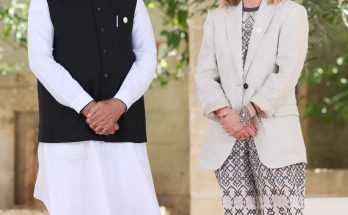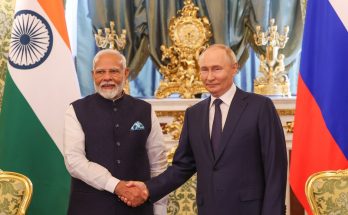
By Muktesh Pardeshi

From an organizational perspective, India’s G20 Presidency has been widely recognized as a great success. The Presidency, which began on December 1, 2022, has completed nine months of its substantive work by hosting an impressive tally of over 200 meetings across nearly 60 different locations. There has been a great deal of popular support for the country’s diplomatic efforts. Like the Chandrayaan-3 landing moment in the last week of August, this Presidency has been a high point for India’s global leadership, public policy-making and showcasing India to the world; it is now a part of everyday language in India.
To shed light on the multifaceted approach underpinning India’s G20 Presidency, we can identify seven ‘petals’ that have shaped both its substantive and organizational aspects:
G20 for All
The making of India’s Presidency is inspired by a vision of ‘G20 for All’. Speaking at the Bali Summit 2022, Prime Minister Shri Narendra Modi articulated that India assumed leadership of this intergovernmental forum during a period marked by concurrent challenges of geopolitical tensions, economic deceleration, surging food and energy costs, and the enduring repercussions of the pandemic. He pledged that India’s stewardship would be “inclusive, ambitious, decisive, and action-oriented.”
Robust Organizational Framework
The absence of a permanent secretariat or dedicated staff within the G20 framework places the onus on the Presidency to establish a robust support system. On February 15, 2022, the Union Cabinet approved the setting up of a G20 Secretariat and its reporting structures for the implementation of overall policy decisions and arrangements needed for steering India’s Presidency.
Subsequently, the G20 Secretariat swiftly assumed operational status, shouldering responsibilities related to substantive matters, technical intricacies, media management, security protocols, and the overall organization of India’s G20 Presidency. It is guided by an Apex Committee headed by Prime Minister Modi, and comprises the Finance Minister, Home Minister, External Affairs Minister, and G20 Sherpa to provide overall guidance to India’s G20 Presidency.
Notably, the New Delhi Summit will mark Prime Minister Modi’s 10th participation in a G20 summit. As a host leader, he has tasked the Secretariat to develop an organizational plan to give a “full experience of India’s amazing diversity, inclusive traditions, and cultural richness” to visiting guests. This can be possible only by adopting a ‘whole-of-country approach,’ in which Central Government Ministries, States and Union Territories, and local bodies all become stakeholders. Over the past nine months, this approach has emerged as our guiding mantra.
Unifying Principles: Logo and Theme
The G20 logo draws inspiration from the vivid hues of India’s national flag – saffron, white, green, and blue. Within this logo, a harmonious juxtaposition emerges, as it interweaves the image of planet Earth with the lotus, India’s national flower, symbolizing growth amidst challenges. The Earth symbolizes India’s deeply-rooted pro-planet ethos, reflecting life in perfect alignment with the natural world.
Below the G20 logo is ‘Bharat’, written in the Devanagari script. The theme of India’s G20 Presidency – ‘Vasudhaiva Kutumbakam’ or ‘One Earth, One Family, One Future’ – is drawn from the ancient Sanskrit text of the Maha Upanishad. Essentially, the theme affirms the value of all life – human, animal, and plant – and its interconnectedness in the wider universe. During the conceptualization of this theme, it became evident that India was championing a pro-planet philosophy, emphasizing the value of all living beings, the bonds that unite us, and our collective destiny.
The logo and the theme together convey a powerful message of India’s G20 Presidency, which is of striving for just and equitable growth for all in the world, as we navigate through these turbulent times, in a sustainable, holistic, responsible, and inclusive manner. India is committed to take all along. India’s pledge is to ensure that no one is left behind, thus encapsulating the essence of ‘G20 for all.’
Advancing G20 Agenda
India has been an active participant in the G20 ever since it was founded in 1999 as an informal forum for the Finance Ministers and Central Bank Governors of the most important industrialized and developing economies. India hosted a meeting of G20 Finance Ministers and Central Bank Governors in 2002.
The G20 Presidency is responsible for bringing together the G20 agenda in consultation with other members, especially the ‘troika’ and in response to developments in the global economy. During India’s Presidency, the members of the G20 troika are Indonesia, India and Brazil, all dynamic emerging economies.
In addition to the core member countries, encompassing 19 nations and the European Union, each G20 Presidency has been inviting other guest countries and international organizations (IOs) to participate in the G20 meetings and Summit. India has invited Bangladesh, Egypt, Mauritius, the Netherlands, Nigeria, Oman, Singapore, Spain and UAE as guest countries. For Guest IOs, India has invited ISA, CDRI and ADB in addition to the regular IOs (UN, IMF, WB, WHO, WTO, ILO, FSB and OECD) and Chairs of Regional Organizations (AU, AUDA-NEPAD and ASEAN). Therefore, New Delhi will see participation of 9 Invitee countries and 14 IOs, apart from G20 members.
Under our Presidency, several noteworthy additions have been made to the agenda. This includes the establishment of a new Working Group focused on Disaster Risk Reduction, the introduction of a new Startup20 Engagement Group, and the implementation of two distinct Initiatives: a Roundtable of Chief Scientific Advisors and a Conference on Cyber Security. This ambitious agenda comprises a comprehensive array of 37 work streams and subject areas, encompassing vital domains such as trade, climate change, sustainable development, health, agriculture, energy, environment, climate change, and anti-corruption, among others.
Giving Voice to Global South
When India assumed the Presidency last December, it was acutely conscious that most of the Global South will not have a direct seat at the G20 table India. Therefore, a strategic decision was made to convene the Voice of The Global South Summit in January 2023. India heard from 125 nations directly about their challenges and priorities and amplifying these voices has taken its Presidency to a higher plane.
We are also seeing the highest participation from Africa at the New Delhi Summit: South Africa (the only African member country), Mauritius, Egypt, Nigeria, Africa Union Chair (Comoros), and the African Union Development Agency-New Partnership for Africa’s Development (AUDA-NEPAD). Under India’s leadership, the support for a permanent membership for the African Union has gained momentum and, in all likelihood, it may become a reality if all leaders endorse this long-pending proposal next week.
Narrating India Story
G20 meetings across India have provided unique opportunities to present and share the India story with the global community, be it its diversity, culture, democracy, development and technological transformation.
At the newly-built Summit venue, Bharat Mandapam, several thematic exhibits will be showcased such as ‘Bharat: Mother of Democracy’, which intends to highlight that “taking the consent of the people in governance has been part of life since earliest recorded history”. It will also include a Digital India Experience Zone and Crafts Bazaar, which will showcase and sell handicrafts products from different parts of India with a special focus on One District One Product (ODOP), Geographical Indication (GI) tagged items and products crafted by women and tribal artisans. Delegates can also look forward to special live demonstrations by master craftsmen, enhancing the immersive experience.
People’s G20

The 2023 Presidency, which has come to India for the first time, is more than just a multilateral diplomatic endeavour; it has evolved into a year-long national undertaking and celebration, involving the entire Central Government, all 36 States and Union Territories, the Parliament, businesses, hospitality industry, academia, professionals, scientists, cultural groups, media, and most notably, the youth.
In the annals of independent India’s history, there has never been an event of such magnitude and scope carried out over an entire year, touching every corner of the nation. We have embraced a distinctive approach, pioneered by Prime Minister Shri Modi himself in his Mann Ki Baat address, emphasizing the infusion of Jan Bhagidari (People’s Participation) into our endeavours. Aligning with this vision, we have achieved an unparalleled geographical reach for G20 meetings, with 230 meetings scheduled across 60 different locations – a remarkable feat under any G20 Presidency. Our success in engaging our citizenry as active participants in the process stands as a testament to our commitment to inclusive governance.
There is a profound sense of national pride amongst people regarding India’s G20 Presidency and its pivotal role in projecting India onto the global stage. For India, the G20 Presidency also marks the beginning of ‘Amritkaal’, the 25-year period leading up to the centenary of its independence in 2047, towards a prosperous, inclusive and developed country. In this context, our G20 leadership is poised to leave an enduring legacy by bolstering our infrastructure and capacity in physical, intellectual, and organizational domains, showcasing India’s potential to the world, and shaping a positive global narrative that echoes our achievements and aspirations.
This article is included in the Summit Edition of India and the World magazine-journal, focused on India’s G20 presidency. It has been published to mark the September 9-10 G20 summit in New Delhi. To subcribe or buy, write to: indiawritesgroup@gmail.com

(Ambassador Muktesh Pardeshi is currently Special Secretary in India’s G20 Presidency Secretariat. With a distinguished diplomatic career spanning over three decades, he has served as India’s Ambassador to Mexico, High Commissioner to New Zealand, and Chief Passport Officer of India. Views are personal.)


